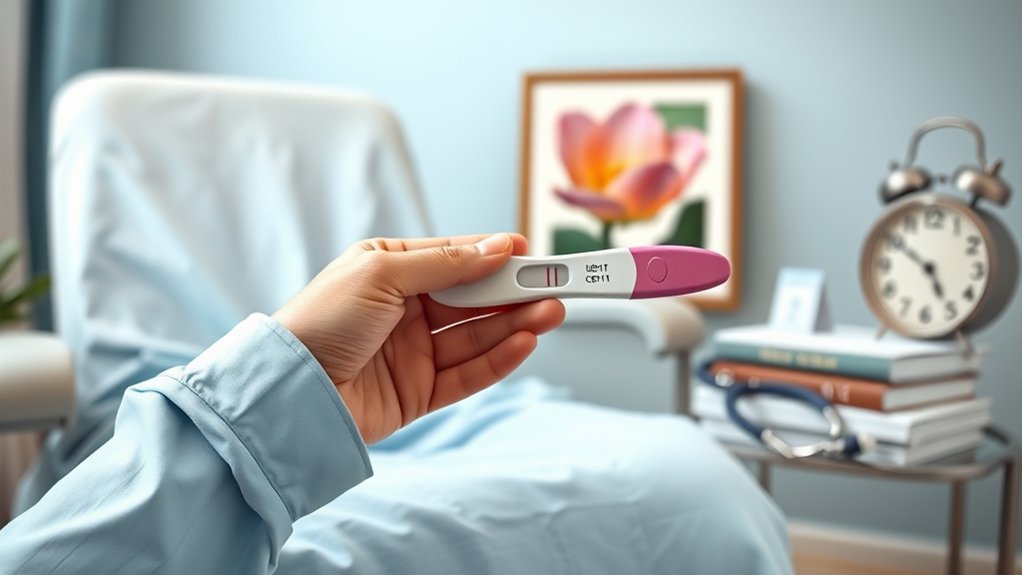Did you know that about 10-20% of known pregnancies result in a chemical pregnancy? This early loss can be confusing and emotional. If you find yourself in this situation, it’s important to know when to seek medical help. Understanding the signs and symptoms can make a significant difference in your care and peace of mind. So, what should you look out for?
Understanding Chemical Pregnancy
When you hear the term “chemical pregnancy,” it refers to a very early miscarriage that occurs shortly after implantation. This usually happens within the first few weeks of pregnancy, often before you even realize you’re pregnant.
A chemical pregnancy is characterized by a fertilized egg that successfully implants but fails to develop further, ultimately leading to a loss that may present as a late period. It’s often detected through a pregnancy test that shows a positive result, only to turn negative within days.
While it’s a common experience, understanding it can help alleviate feelings of confusion or grief. Many women encounter a chemical pregnancy without any underlying health issues, making it a natural, albeit unfortunate, part of the reproductive process.
Common Signs and Symptoms
Chemical pregnancies often present with subtle signs and symptoms that can be easily mistaken for a regular menstrual cycle. You might notice light spotting or bleeding, which may occur around the time your period is due.
Some women experience mild cramping, similar to menstrual cramps. You could also have a slight increase in pregnancy-related symptoms, like breast tenderness or fatigue, although these often don’t last long.
Mild cramping and brief symptoms like breast tenderness can signal a chemical pregnancy.
Many women report a brief change in their sense of smell or taste. These signs can be very fleeting and may not prompt you to think twice.
It’s important to pay attention to your body’s signals, as recognizing these early symptoms can be vital for understanding your reproductive health.
When to Seek Medical Advice
Recognizing the signs of a chemical pregnancy is important, but knowing when to seek medical advice is equally essential. If you experience heavy bleeding, severe abdominal pain, or persistent symptoms beyond a few days, don’t hesitate to reach out to your healthcare provider.
| Symptoms to Monitor | When to Call a Doctor |
|---|---|
| Heavy bleeding | If it soaks through a pad in an hour |
| Severe abdominal pain | If pain is intense and doesn’t improve |
| Symptoms lasting longer than expected | If symptoms continue beyond a week |
Being proactive can prevent complications. Remember, it’s always better to err on the side of caution. Your health is important, so trust your instincts and get the support you need.
Emotional Impact and Support
Steering through the emotional aftermath of a chemical pregnancy can be overwhelming. You might feel a mix of grief, confusion, or frustration as you process this loss.
It’s important to acknowledge these feelings; they’re valid and common. Reach out to friends or family who can provide support, or consider talking to a therapist who specializes in reproductive loss.
Connecting with others who’ve experienced similar situations can also help you feel less isolated. Remember that healing takes time, and it’s okay to seek help as you navigate these emotions.
Journaling your thoughts or engaging in creative outlets can also provide you with a sense of relief. Prioritizing your emotional well-being is essential during this challenging time.
Next Steps After a Chemical Pregnancy
Processing a chemical pregnancy often leads to questions about what to do next. First, allow yourself time to grieve; this experience can be emotionally challenging.
Afterward, it’s a good idea to track your menstrual cycle to understand when your body returns to normal. If you’re considering trying to conceive again, consult your healthcare provider for personalized advice on timing and any necessary evaluations. They can help guide you on next steps and address any concerns.
Additionally, monitor your physical health for any unusual symptoms, such as heavy bleeding or persistent pain, as these may require medical attention.
Finally, consider seeking support from friends, family, or support groups to aid in emotional healing during this time.
Frequently Asked Questions
Can a Chemical Pregnancy Affect Future Pregnancies?
A chemical pregnancy typically doesn’t impact future pregnancies. Most women go on to have successful pregnancies afterward. However, if you experience repeated losses, it’s worth consulting your doctor for personalized guidance and testing.
What Causes a Chemical Pregnancy?
When it rains, it pours; hormonal imbalances, outdated embryos, or abnormal implantation can cause a chemical pregnancy. These issues often prevent the embryo from developing properly, leading to an early miscarriage before a woman realizes she’s pregnant.
How Can I Differentiate Between a Chemical Pregnancy and a Miscarriage?
You can differentiate by timing; a chemical pregnancy occurs shortly after implantation with early symptoms, while a miscarriage happens later, often with more pronounced bleeding and cramping. Tracking symptoms helps clarify your situation.
Is It Safe to Try Conceiving Again Immediately?
When the dust settles, it’s generally safe to try conceiving again right away. Your body often resumes its normal cycle quickly, but it’s wise to consult your doctor for personalized advice before proceeding.
Will a Chemical Pregnancy Show up on a Home Pregnancy Test?
Yes, a chemical pregnancy can show up on a home pregnancy test. Since it results in a positive test due to early hormonal changes, you might see a faint line before the period starts.
Conclusion
As you navigate the nuances of a chemical pregnancy, prioritize your health and happiness. Stay alert for alarming signs like heavy hemorrhaging or severe soreness. Share your feelings with supportive souls, who can provide comfort during this challenging chapter. Afterward, consider consulting a healthcare professional for guidance on the next steps forward. Remember, your well-being matters, and seeking support is a significant step toward healing and hope.
